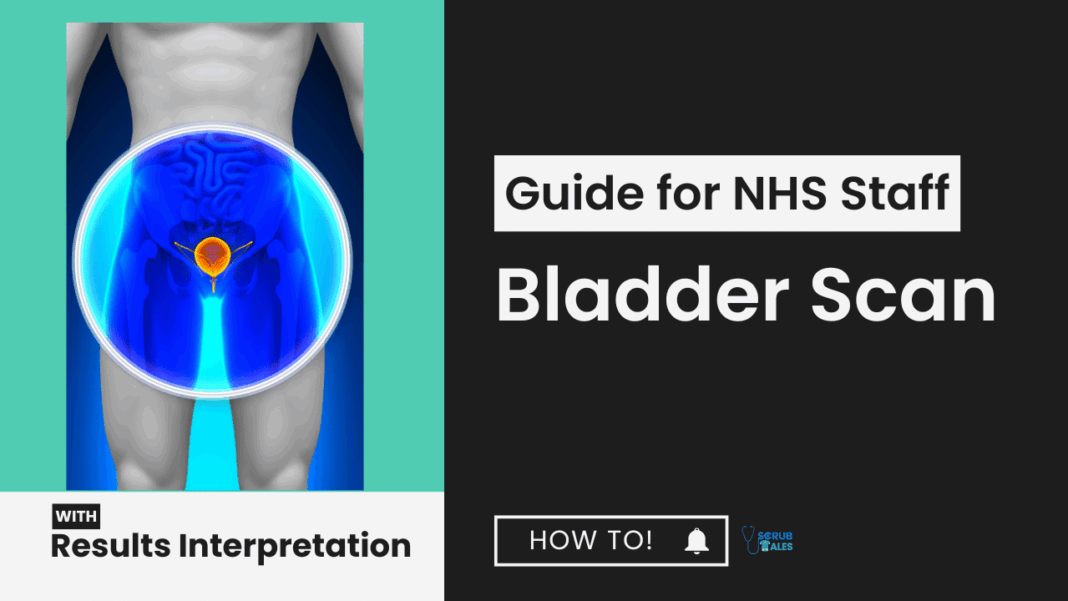When I first moved to the UK as an international medical graduate (IMG), one of the most useful things I did early on was complete the Advanced Life Support (ALS) course.
Not only did it boost my clinical confidence, but it also helped me stand out in NHS job applications — especially for roles in acute care.
In this guide, I’ll walk you through everything you need to know about the ALS course in the UK: from finding the right course and costs to how it fits into your NHS career and how to get it reimbursed if you’re working.
Whether you’re applying for NHS jobs or already working as a junior/middle-grade doctor, this guide is for you.
What Is the ALS Course?
Advanced Life Support (ALS) is a two-day, Resuscitation Council UK (RCUK) certified course that teaches you how to manage cardiac arrests and medical emergencies in adult patients. It’s based on the latest Resus UK 2021 guidelines and is considered the gold standard for training clinicians to lead and manage resuscitations.
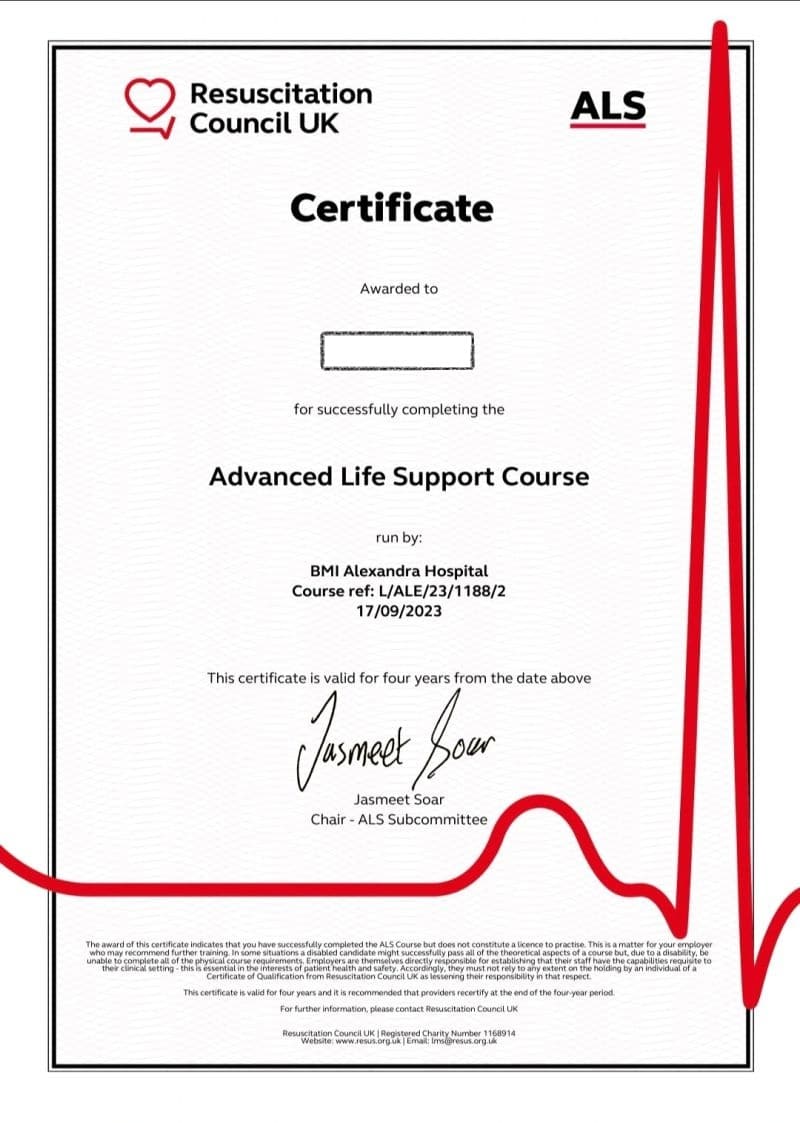
What You’ll Learn:
- How to assess a deteriorating patient using ABCDE
- Immediate life-saving interventions (high-quality CPR, defibrillation)
- ECG rhythm recognition and emergency drug use
- Airway management (basic and advanced techniques)
- Team leadership in cardiac arrests (non-technical skills)
- Identification and treatment of reversible causes (6 Hs and 6 Ts)
You’ll rotate through lectures, skill stations, simulations (CASTeach), and a final scenario-based assessment (CASTest), along with a multiple-choice written test. This is still easier than MRCP 1 exam which is a nightmare.
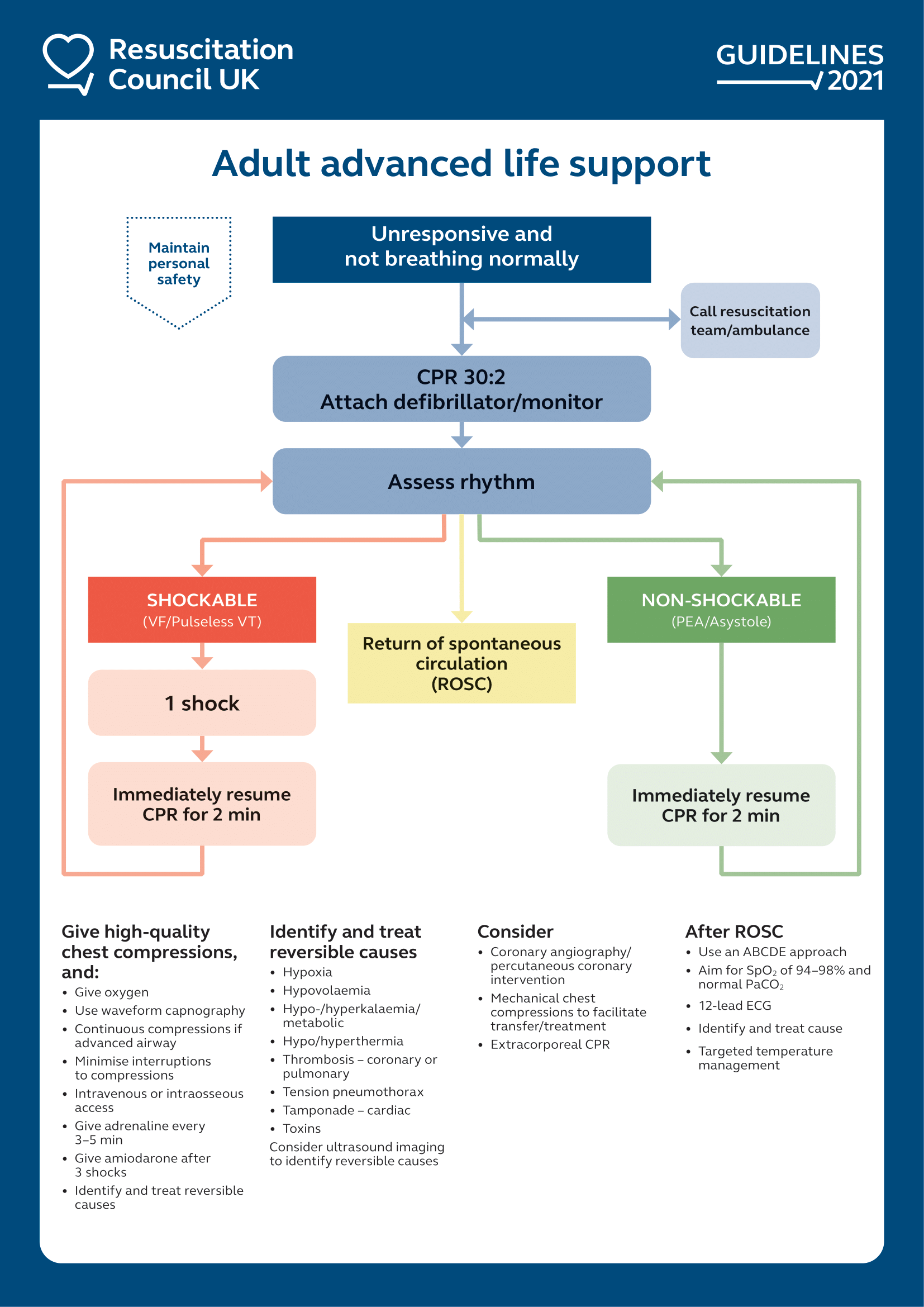
Who Should Take the ALS Course?
The ALS course is intended for any clinician involved in resuscitation or emergency care. This includes:
- Foundation Year 2 (FY2) doctors
- Core trainees (e.g. IMT, ACCS)
- Trust-grade and middle-grade doctors
- ICU/ED/acute medical ward staff
- Anaesthetics, emergency medicine, and acute medicine applicants
- Paramedics and critical care nurses
As an IMG, completing ALS shows UK employers that you’re ready to take clinical responsibility in emergencies and can adapt to UK protocols. Trusts expect familiarity with Resus UK algorithms, especially in acute settings.
Most importantly, this is a pre-requisite for all NHS doctors starting their on-calls.
ALS vs ILS vs BLS – Which One Matters for NHS Jobs?
| Course | Full Form | Duration | Who Should Do It | NHS Value |
|---|---|---|---|---|
| ALS | Advanced Life Support | 2 days | Doctors in ED, ICU, anaesthetics, acute medicine | Required or highly preferred |
| ILS | Immediate Life Support | 1 day | Nurses, junior doctors, GP trainees | Helpful but not enough for acute specialties |
| BLS | Basic Life Support | Few hours | All healthcare workers | Mandatory basic competency |
Why ALS Helps NHS Job Applications
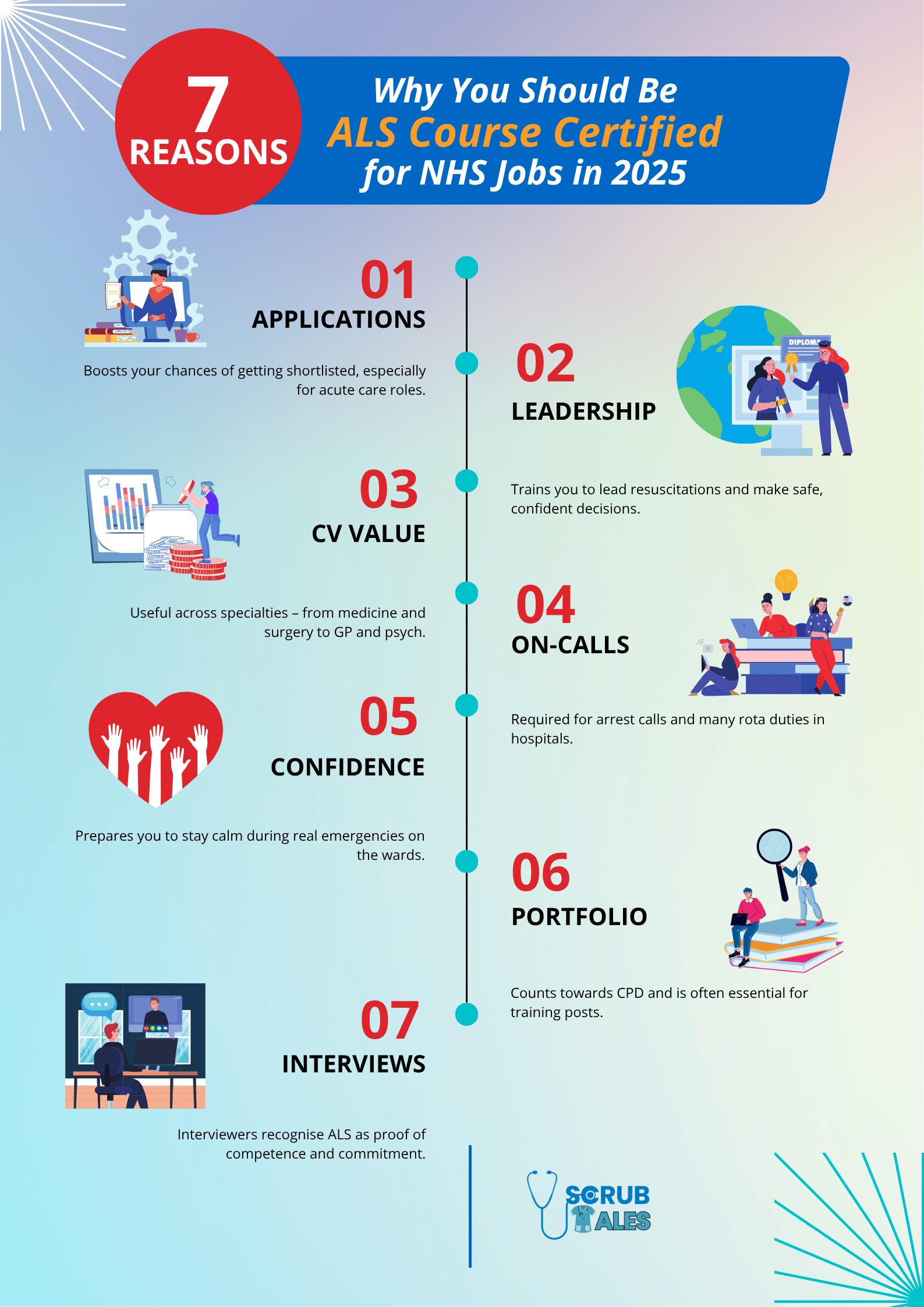
For IMG doctors, having a UK ALS certificate improves your chances of landing interviews and being shortlisted. Many NHS job postings on TRAC Jobs include ALS as either:
- Essential (especially for ED, ITU, acute medicine)
- Desirable (for medical wards, GP trainees, psychiatry)
When recruiters see ALS on your CV, it tells them:
- You’ve been trained in UK-standard emergency care
- You can act confidently and lead during medical emergencies
- You’re familiar with UK terminology and guidelines (ABCDE, 4 Hs & 4 Ts)
If you’re applying through TRAC jobs, some posts even auto-filter candidates without ALS. So, completing it in advance makes you interview-ready.
NHS Impact of ALS for IMGs
| Career Stage / Goal | How ALS Helps |
|---|---|
| Applying for Trust-grade/SHO posts | Higher chance of shortlisting and interview |
| Already working in NHS | Eligible for crash team roles; improves rota duties |
| Preparing for training posts | Mandatory or desirable in many CT/ST interviews |
| Portfolio development | Adds CPD, clinical skills, and patient safety credits |
| Working in acute/emergency care | Expected competency; often required by trust |
Completing the Advanced Life Support (ALS) course in the UK is more than just ticking a box — it’s a career accelerator, especially if you’re aiming for hospital-based roles in acute care settings.
1. Makes Your Application More Competitive
Many NHS job descriptions (especially for ED, ICU, and acute medical wards) list ALS course as either a mandatory or desirable qualification. Having it before applying signals that:
- You understand UK clinical standards.
- You’re job-ready and won’t need additional training before joining on-calls or crash teams.
- You’ve invested in self-improvement and clinical preparedness.
Recruiters reviewing TRAC applications often use filters. Candidates with valid UK ALS certification are more likely to be shortlisted — even over those with extra degrees or diplomas, but without ALS.
2. Demonstrates Emergency Leadership Skills
ALS training focuses not only on clinical skills but also on non-technical skills: team leadership, closed-loop communication, and quick decision-making. These are critical in NHS environments where emergencies are often team-based and protocol-driven.
In scenarios like:
- Cardiac arrest on the ward
- Rapid deterioration in A&E
- Code blue emergencies
An ALS-certified doctor is trusted to step up and lead the team, confidently and calmly.
3. Strengthens Your CV Across Specialties
Even if you’re not applying to ED or ICU, ALS course strengthens your application for:
- Internal Medicine (especially rotations in Acute Med)
- Anaesthetics and ITU fellowships
- GPVTS (where ILS is usually enough, but ALS adds value)
- Psychiatry jobs in inpatient or elderly settings (where physical deterioration occurs often)
- Surgical wards (especially if covering on-calls)
Many Clinical Fellow, Trust-grade, and even LAS CT1/SHO posts mention ALS in their essential or desirable criteria. Having it boosts your chances in shortlisting and interviews.
4. Required for Many On-Call Duties
If you’re working in an NHS hospital that runs:
- Medical emergency teams (MET)
- Cardiac arrest teams
- Night ward cover with resus calls
You’ll likely be expected to respond to emergencies. ALS-certified doctors are often preferred or required to be rota’d into these shifts.
In fact, in some trusts:
- You cannot be first on-call for acute take or crash calls without ALS
- It may be a pre-requisite before assigning you higher-responsibility shifts
5. Boosts Confidence and Performance in Real Emergencies
Having ALS course certification helps in practice, not just on paper. You’ll be more confident when:
- Assessing an unresponsive patient using ABCDE
- Delivering high-quality CPR with correct timing
- Delegating during arrests and remembering what drugs to give (and when)
- Communicating with crash teams or the 2222 bleep holder
Many IMG doctors find that their first real NHS arrest call becomes far less daunting if they’ve already done the ALS course — because the simulations and leadership practice mirror real scenarios.
6. Recognised in Interviews and Appraisals
Whether you’re applying for a new post or preparing for your ARCP/appraisal, ALS is a solid line item under:
- Clinical governance
- CPD (Continuing Professional Development)
- Patient safety & resuscitation training
- Mandatory skills for future rotations (e.g. ACCS/ICM/EM/CT1)
Interviewers often ask:
“Have you done ALS?” or
“Would you be comfortable leading an arrest?”
Having the certification allows you to confidently say yes — and discuss the scenarios you led in training.
7. Future-Proofs Your Portfolio for Training Applications
ALS is either mandatory or recommended in:
- Internal Medicine Training (IMT)
- Anaesthetics Core Training
- ACCS
- GPVTS (desirable, though ILS may suffice)
Even for those not yet in a training program, having adult Advanced Life Course certification helps build a stronger portfolio under:
- Clinical skills
- Courses & qualifications
- Audit/QI involvement (you can join your hospital’s resus audit team)
- Teaching (if you later help train juniors in BLS/ILS)
ALS Course Structure – What to Expect
Format:
- Duration: 2 full days (usually 8:00–17:00)
- Delivery: Face-to-face with supervised skill stations
- Pre-course work: Online MCQ and reading from ALS manual
- Assessment: Practical scenario (CASTest) + MCQ on final day
Key Components:
- Airway station: Practice bag-valve mask ventilation, supraglottic airway use, intubation (if eligible)
- Cardiac arrest station: Hands-on high-quality CPR with AED/defibrillator use
- Rhythm recognition: Practice with ECG strips – shockable vs non-shockable
- Drug algorithms: Learn when to give adrenaline, amiodarone, atropine etc.
- Team leadership: Simulated resuscitations where you act as team leader
- CASTeach + CASTest: Simulations followed by scenario-based exam
ALS Course Overview
During the two-day Resus UK ALS course, you rotate through lectures, interactive skill stations and realistic simulations. You will practice on manikins and run full cardiac arrest scenarios (both to learn – “CASTeach” – and to be tested – “CASTest”).
Instructors will coach you on advanced airway management, IV/IO access, ECG rhythms (tachy/brady, pacing, cardioversion), defibrillation, and drug use, all following the 2021 UK Resuscitation Guidelines. By the end of the course you will:
- Assess the deteriorating patient (ABCDE) and identify causes (the “Hs & Ts”).
- Perform adult CPR and safely operate a defibrillator or AED.
- Lead/manage a cardiac arrest team, assigning roles and using closed-loop communication.
- Apply non-technical skills like teamwork, leadership and situational awareness to run an effective resuscitation.
During ALS course, you’ll spend hours practicing CPR and airway management on manikins as part of multi-disciplinary simulations.
Before attending, you must complete a pre-course package: reading the official RCUK ALS Manual and passing a set of online MCQs. On-course, the first day typically covers theory (lectures on cardiac arrest, ECGs, drugs, etc.) and hands-on stations (airway, ventilations, monitoring).
The second day focuses on team simulations and assessments. At the end you’ll take the CASTest (scenario exam) and a written MCQ. Passing earns you an RCUK ALS Provider certificate valid for 4 years.
Finding the Right ALS Course Provider (RCUK Accredited Only)
Only book with RCUK-certified centres – these are the only ones accepted by NHS trusts. You can find them on the Resus Council UK course finder.
Common Locations in England:
- London (UCLH, St George’s, King’s College)
- Manchester (Wythenshawe, Salford)
- Birmingham (Queen Elizabeth Hospital)
- Leeds, Liverpool, Newcastle, Cambridge, Oxford
Cost Breakdown:
- NHS centres (hospital-run): £400–£480
- Private centres: £500–£600
- ALS Recertification: ~£300 (1-day)
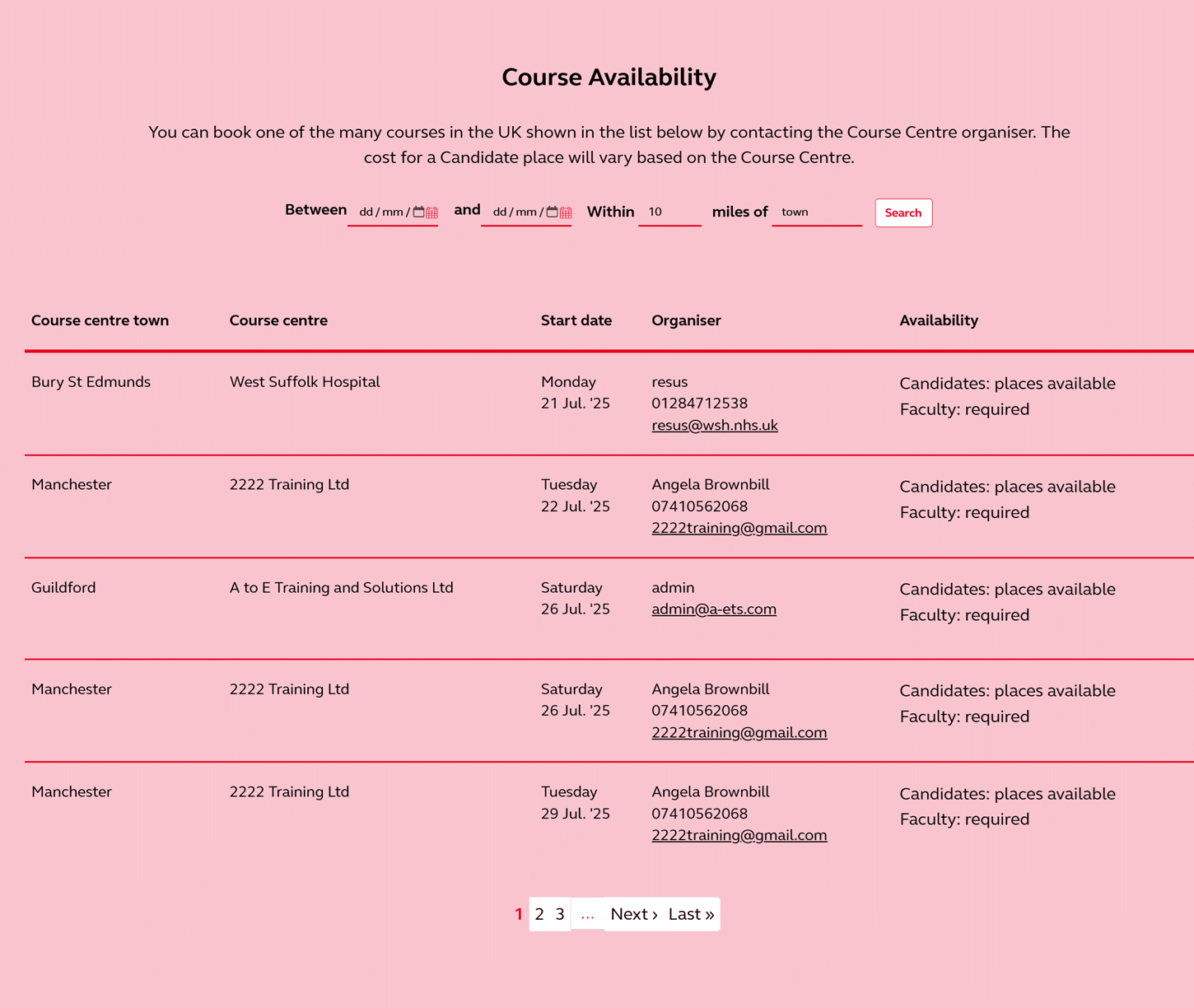
Some providers offer e-ALS (online theory + 1-day in person), but most IMG doctors opt for full 2-day face-to-face courses for better confidence.
ALS Courses in Manchester
Here are some RCUK-certified ALS course providers in Manchester, perfect for IMG doctors seeking UK-standard training:
🔹 2222 Training Ltd
- Course types: 2‑day ALS and 1‑day e‑ALS
- Dates & Fees:
- 2‑day ALS: £699
- 1‑day e‑ALS: £599
- Upcoming dates:
- 2‑Day ALS on 22 July, 26 July, 29 July, 2 August, etc. (€see schedule above)
- Venue: Dunham House, Cross Street, Sale, Manchester M33 7HH
- Contact: 07410 562068 / [email protected]
- Note: RCUK-accredited instructors with NHS background; North West coverage
🔹 Advanced Life Support Group (ALSG)
- Type: Offers Advanced Life Support (ALS) training and related emergency courses
- Location: Registered centre in Manchester (Ellesmere Street, Swinton, M27)
- Courses Include:
- Advanced Life Support (adult)
- Advanced Paediatric Life Support (APLS)
- Trauma and Obstetric emergency training
- Booking: Via ALSG website with Paypal option
- Contact: +44 161 794 1999 (Mon–Fri, 10 AM–4 PM)
🔹 Manchester Hospital Trust Courses (via RCUK Directory)
While not linked directly above, Manchester NHS Trusts (e.g., Wythenshawe, Salford, Manchester Royal Infirmary) offer in-house ALS courses, visible on the RCUK course finder. These are generally £400–£480 and first-come, first-served for hospital staff.
📊 Comparison Table: Manchester ALS Providers
| Provider | Format | Cost (approx.) | Location | Booking Contact |
|---|---|---|---|---|
| 2222 Training Ltd | 2-day & e‑ALS | £699 / £599 | Dunham House, Sale, Manchester M33 | 07410 562068, [email protected] |
| Advanced Life Support Group | 2-day ALS | Varies on date | Ellesmere St, Swinton, Manchester M27 | +44 161 794 1999 |
| Manchester NHS Trusts | 2-day ALS | £400–£480 | Manchester hospitals (e.g. Wythenshawe) | Via NHS Trust intranet/RCUK directory |
Best Time to Do ALS Course
Do adult Advanced Life Support course early – ideally within your first few months in the UK, especially if:
- You’re applying for trust-grade/SHO posts
- You’re rotating to ED or ICU
- You want to strengthen your NHS CV before interviews
Trusts may have long waiting lists for internal courses. If planning interviews for August or February rotations, try to get ALS certification at least 4–6 weeks before.
Reimbursement: How NHS Doctors Can Claim ALS Course Cost
We junior doctors are always low on budget after the salary to be honest, a reimbursement is often a dream.
Scenario 1: You’re a Trainee (IMT, GPVTS, ACCS, etc.)
- Check your curriculum: ALS course is usually mandated.
- Apply for study leave: Through your trust’s online system (e.g. DRS/Study Leave Portal).
- Book the course: Pay up front or request a study budget code.
- Submit receipts: Get reimbursed via expenses.
NHS England usually allows £300–£500 reimbursement depending on trust policy. Some will cover full cost if course is mandatory.
Scenario 2: You’re a Trust-Grade or Non-Training Doctor
- Request funding from Medical Education or your clinical supervisor
- Some trusts reimburse if course is required for your current post
- Keep receipts and apply through internal channels
- Some trusts provide a “staff development budget” or offer subsidised adult Advanced Life Support course
Tips:
- Mention how adult Advanced Life Support course benefits patient safety and your role
- Check if the trust already runs internal ALS courses at a discount
- Always check local deadlines for reimbursement (usually within 6–12 months)
Check out our list of Free and Paid CPD Courses You Can Do.
What If You Fail the ALS Course?
Don’t panic — it happens.
- You will receive feedback and often be offered one reassessment attempt (free or with a small fee).
- If you fail CASTest (scenario exam), you may be invited for a reassessment on a later date.
- Failing the written MCQ may require repeating the entire course.
Advice if You’re Worried:
- Ask instructors for mid-course feedback
- Don’t stress if English is not your first language — focus on communication
- Practice leadership language: “I’m taking the lead”, “Start CPR”, “Give adrenaline 1mg IV now”
The goal is not perfection, but safe, structured leadership.
My Top Tips from Experience
To get the most out of ALS course, prepare thoroughly. Here are some friendly tips:
- Read the Manual & Pre-MCQ: The official ALS Manual (RCUK) is your bible. Read it cover-to-cover before the course and complete the online MCQ. This covers the theory and familiarises you with the algorithms.
- Review CPR Videos: The RCUK website and many online resources have videos on adult cardiac arrest management. Watching a few (e.g. team resuscitation in simulation) will help you visualise the scenarios.
- Practice ECG Rhythms: Brush up on recognizing common arrest rhythms (VF, VT, asystole, PEA) and some tachycardias (SVT, VT, AF). The course assumes you know basic ECG interpretation.
- Drill the Algorithm Aloud: In scenarios, talk through your actions. For example, say “I’m checking pulse and starting CPR” or “IV access secured, give adrenaline” as you do them. Instructors want to hear that you’re systematically following the algorithm (like using ABCDE and remembering the 6Hs/6Ts).
- Stay Calm and Confident: It’s normal to feel nervous. Treat the simulation like a team exam – take your time, ask questions, and assign roles. Even if you make minor mistakes, instructors focus on your approach and communication.
- Learn Non-Technical Skills: Listen to team members, direct them politely, and ask for help when needed. Closed-loop communication (repeat orders back) and calling for help early are actually assessed parts of adult Advanced Life Support course.
Going into the course with these strategies in mind will make the experience smoother and more enjoyable. I found that narrating my steps (like a “driving test” in resus) really helped and seemed to impress the examiners. (Note: the linked tips aren’t official sources, but from trainee discussions – nonetheless, they capture common advice.)
Conclusion
The ALS course is more than a certificate — it’s a symbol of your readiness for serious clinical responsibility. It shows you can lead a team, think under pressure, and save lives using UK standards.
For IMG doctors working or applying in the NHS, it’s a must-have investment. Whether you’re aiming for core training ready with a CREST form, a trust-grade role, or simply want to upskill — start early, book a certified course, prepare well, and don’t be afraid to lead.
You’ll come out not just with a certificate — but with practical, life-saving skills you’ll carry throughout your career.
ALS Courses FAQs
Do I need to get ALS certification to get an NHS job?
Yes, for most acute specialties. It is strongly recommended for all others.
Can I do ALS course while applying for jobs?
Absolutely. Doing it before interviews strengthens your CV.
Is an ALS from overseas accepted?
Not usually. NHS trusts expect RCUK-accredited ALS.
Is there an ALS course certificate?
Yes. You get a 4-year Resuscitation Council UK ALS certificate and ID number.
What’s the difference between ALS and e-ALS?
ALS (Advanced Life Support course): Full 2-day in-person
e-ALS: Online theory + 1 day in person
Both lead to same certificate, but full ALS is better for IMG doctors who are new to UK system.

